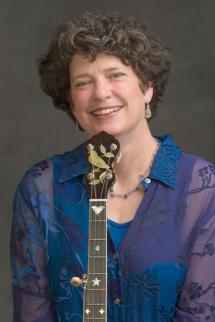North Carolina Folklore Journal “The Brown-Hudson Award”
Many of the recipients of the Brown-Hudson Folklore Award have a singular specialty. They might be keepers of their family’s traditional craft, whether it is ballad singing or throwing pots. Some are known for writing and educating by exploring cultural roots and traditions in our state. Others have kept alive a unique community event. I think it is rare to see a person merge as many folk art traditions as David Holt has. His contributions to the state of North Carolina through his work in preserving and showcasing our heritage, and his ability to communicate these traditions to a variety of audiences are remarkable. I would like to nominate David Holt for the 2007 Brown-Hudson Folklore Award.
David came to North Carolina in 1968. His quest seemed singular and simple, finding those keepers of the clawhammer banjo style. But David discovered more than banjo music. He found communities of musicians who broke the stereotypes of the reclusive mountaineer. Dellie Norton in Sodom shared her centuries old ballads, similar to those collected in 1915 by Cecil Sharp. He heard Luke and Harold Smathers in Canton whose style of string band music merged with the sound of the swing bands they heard on the radio to create “Mountain Swing.”
He learned from Etta Baker in Morganton an African/Native American woman whose Piedmont blues guitar style had largely been ignored. There was Virgil Craven from the Piedmont, the last of the traditional hammered dulcimer players in the South. And there was the master storyteller, unaffected by the 20th century, Ray Hicks from the “old” Beech Mountain. He also sought out Susie Brunson, 122 years old and voting in Wilmington. She showed David how a washboard is supposed to be played. David searched for musicians of all types, blues and old-time, bluegrass bands and ballad singers, dancers and dance callers. Many of these folks were found less than 60 miles from Fairview, North Carolina where he raised his family and made his home.
David began the Appalachian Music Program at Warren Wilson College in 1975. It was the first undergraduate academic program in which students had the opportunity to study, collect and learn the traditional music of the region. The keystone of the program was bringing in artists from the area to teach the courses, ballad singing with the singers from Sodom Laurel in Madison County, fiddling with Liz and Lynn Smathers-Shaw from Haywood County and flat-pick guitar and country harmony singing with Bucky Hanks from Buncombe County. The Appalachian Music Program also produced a concert series that showcased musicians from the region to community members not limited to the college community. There was the Farmer’s Federation Band with Johnny Rhymer and Chub Parham from Leicester. In the 1930′s and 40′s their band traveled throughout Western North Carolina to play picnics which were hosted by Jim McClure in an effort to organize mountain farmers for economic gain. In the 1980’s they became the “house band” for Western North Carolina Congressman James McClure Clarke. Ralph Lewis, a former Bluegrass Boy, and his two young sons Marty (11) and Don (9) came to play. They perform these days as the widely popular “The Sons of Ralph featuring Ralph.” And there was the momentous night when Wiley and Zeke Morris graced the stage and sang their song “The Salty Dog Blues.”
This wasn’t history in a book. This was living history, in the flesh, in your face and something that made you want this in your life. Many of David’s student’s pursued these traditions in their own way. JeffRobbins went on to share music and stories with countless numbers of school children across the South. Susi Gott became a well known Bluegrass fiddler and has taken her music to France. Tim Duffey started the Music Maker’s Relief Foundation to “help the true pioneers and forgotten heroes of Southern music gain recognition and meet their day to day needs.” Mike Geiger played guitar in the Appalachians string band and then went on to Nashville to write songs for major country artists.
In addition to marking these students for life, David began the Mountain Music Archives, a repository for videos, photographs and audio tapes of musicians, dance callers and storytellers from throughout the surrounding counties. The goal was to provide an archive for future generations to re-visit the distinct gifts of their forebears.
David’s real gift has been his ease in communicating the importance of these traditional arts to audiences from Bolivia to Brevard. As host of the Nashville Network’s, “Fire on the Mountain,” David showcased musicians from the Southern Mountains to a national audience. Through his work with North Carolina Public Television, David brought our traditional crafts, music and more importantly these artisans into the living rooms of fellow North Carolinians through UNC-TV’s “Folkways.”
As David began to meet and know these artists, he began to document them and their work in another way. David is an accomplished photographer and has captured the essence of many of his friends through his photography. During his concerts, David introduces audiences to his mentors through a story, a song and often a visual image. The 2006 Spring/Summer edition of The North Carolina Folklore Journal featured his work.
In recent years David can be found traveling with guitar legend, Doc Watson. Their days on the road nurtured a relationship which allowed Doc to share stories of his personal and professional history with David. These interviews, illustrated by Doc’s guitar playing and singing, resulted in a seventy-two page booklet and three CD set that has been called Doc’s audio-biography. The collection was deemed significant by members of The National Recording Arts and Sciences and awarded the Grammy Award for Best Traditional Folk Music Recording of 2002.
As a collector, preserver, performer and communicator of our traditional folk arts in North Carolina, David Holt has proven to be a worthy ambassador.
Respectfully submitted,
Laura Boosinger

Laura Boosinger
